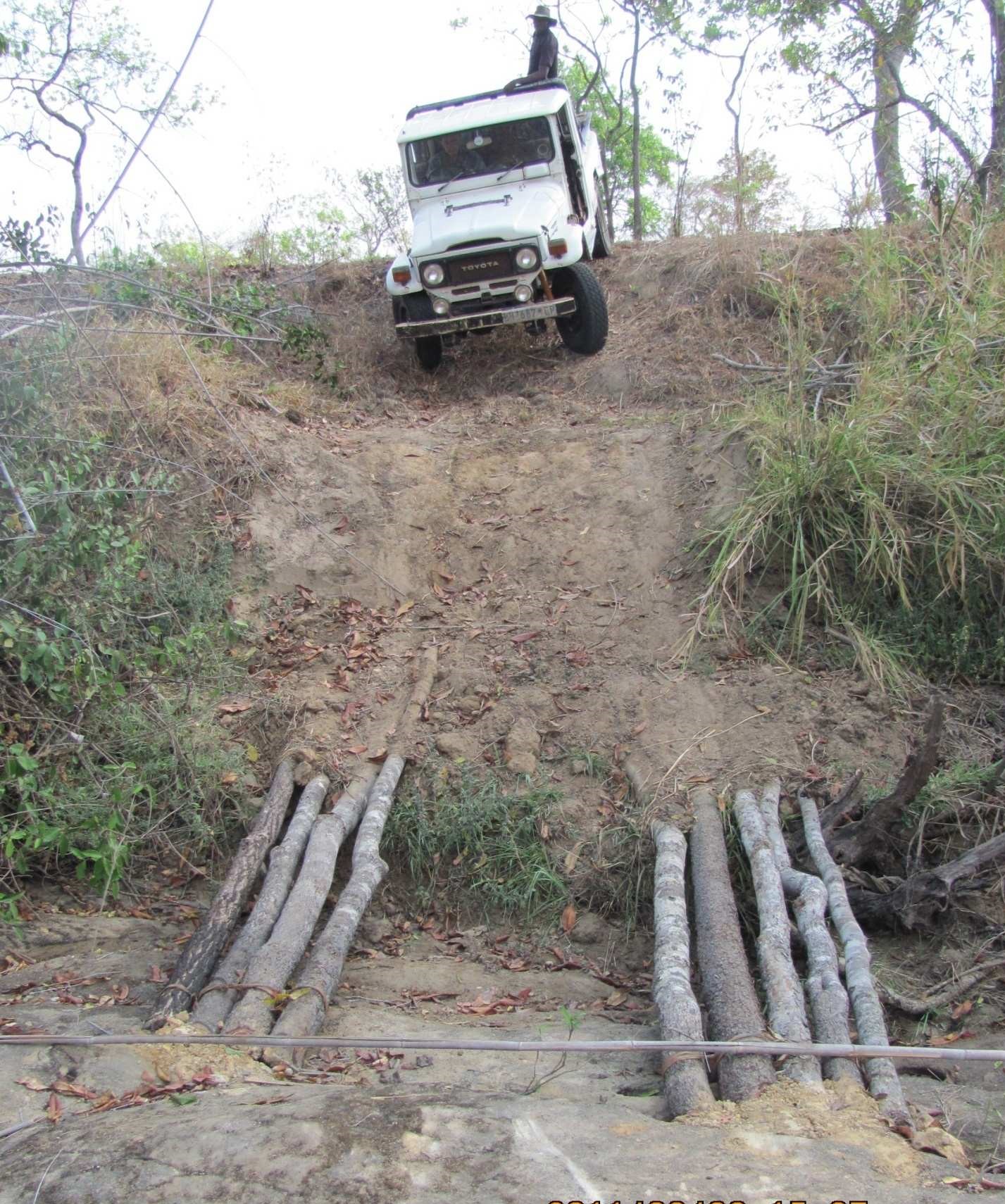Journeys back.
Another piece of pragmatic bush engineering, this time on a feint track winding its way around elephant-sized anthills and man-thick tree trunks to a little bush village. The turned earth says it was made since the last rains. It won’t survive the first of the new season’s showers, but for now, it eases the way of rare traveling hawkers and the odd family member from back there, in deep “civilisation,” where people wear fancy clothes and sunglasses and wheel and deal in obscure ways and come to own vehicles – that are, to the traditional bush people, miracles of mobility; to an engineer, of ongoing operation.
This humble little bridge, and the grand statement of engineering in my previous post are less innocent than they seem at first consideration. They are deceptively heavy on tree usage – each log is one tree in its prime, and, they are put in place to ease the flow of goods from civilisation.
Easily a controversial statement, the last, and so it is, with the adoption of the trimmings of civilisation by humans in the wilderness; it is controversial.
Over the years of my wanderings I have observed its surreptitious creep, and “coming out,” one is able to sense the thickening of its tentacles as one transits from the untouched state. First in tattered bits of western style clothing that have come to replace the loincloth or shoulder cloth for the men – the women have long been wrapping themselves in colourful fabrics initially bartered from Arab traders; it is still as richly colourful, but now it no longer reaches them along the ancient trade routes. Also, a few tools made in factories, some broken and discarded, some still partly functional. Then, bits of machinery, abandoned where they stopped functioning, and tracks used by vehicles, and later ill-maintained roads, and ever-larger villages, some with structures made of materials brought in from further in. And then, roadside commerce, basic in nature, such as charcoal, from chopped down trees, so that roads leading to larger towns have become denuded of all trees for many kilometres on either side. And then, the towns themselves, the full embodiment of the beast, and charming and poignant slips into ever deeper sadness…
Some would call this innocent, no, desirable progress, growth, betterment of lives, alleviation of poverty… It probably is, to some extent, all of that, but over the years of wandering the African wilderness I have seen it bring loss of a way of life and destruction of the fabric of society, misplacement, puzzlement, estrangement, frustration, over-exploitation of resources in its crudest form, desperate poverty (in civilisation terms), bereavement, and ultimately cheap opportunism of various stripes, corruption, pettiness, greed and pervasive petty crime, often physically brutal.
It is a complex matter, with many (probably equally valid) perspectives; it is the story of mankind. It is irreversible, and to me, sad, because it is destroying the African wilderness and the ancient equilibrium that had settled between its human inhabitants and the rest of its natural environment.

Truly enjoyable read. Each thought unfathomable in its expression, yet visually poignant.
“And then, the towns themselves, the full embodiment of the beast, and charming and poignant slips into ever deeper sadness…”
As you mentioned, such a complex debate with so many conflicting perspectives. Sad truth is, it doesn’t really matter what we think and who’s right of wrong about globalisation and development. It will run its course regardless of our arguments for or against it. An ironic reminder that, no matter how civilized we are, we still have so very little control over so many aspects of the evolution of mankind.
Anyways, tx for sharing yet another bit of food for thought to chew on this week :)
Hoffman, thank you for this insight into how our attempts at “economic development,” although well intended, are more about us than those lives we believe we are improving. In rural Bangladesh, one finds plastic remnants of kitchen cooking devices given to families in an effort to keep children from getting burned by their in-home fires. Well meaning NGOs distributed them widely. Then parts broke, no replacements, and they end up as litter. I am thankful for the good hearts of many but it as you say, their efforts and resources don’t always have long-term benefit to our planet.